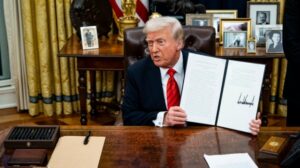The Governor of the Bank of France, François Villeroy de Galhau, called on the European Union today to “wake up” and strengthen its innovation capacities in order to face the “unpredictable” element of the economic policy of US President Donald Trump.
“The most desirable thing is for Europe to wake up,” Villeroy de Galhau said on France Culture.
“We must ‘strengthen innovation and production capabilities in Europe,’ ‘invest better in future technologies and innovate faster by simplifying things,'” he added.
“Europe has many assets,” he continued, citing a single market of around 450 million consumers and startups, “but Europe has slept a bit in the face of the wave of innovation that was largely born in the US and partly in China,” he emphasized.
The Bank of France forecasts economic growth of 0.1% to 0.2% in France for the first quarter, amid strong uncertainties. For 2025, it forecasts a 0.9% increase, just like the government.
“If there is one fundamental threat to the economy today, it is this uncertainty that causes entrepreneurs to wait, postponing their investments, or even consumers (…) who delay their purchases and prefer to save,” warned François Villeroy de Galhau.
“From this perspective, Mr. Trump’s unpredictability (…) does not constitute an effective economic strategy. Everywhere in the world, this increases uncertainty and thus burdens trust and growth,” he noted.
As for Elon Musk, who has been tasked by Trump to reduce the US federal government’s spending, “a brilliant innovator” who, however, uses “extremely harsh methods,” the Governor of the Bank of France said he hopes that “the deterrent forces of American democracy and the economy will act.”
“Protectionism may seem appealing in the short term — we tell ourselves that we are protecting our economy — but it always proves to fail over time, everywhere,” he judged.
While inflation decreased in France and the unemployment rate was 7.3% in the fourth quarter of 2024, “there are still two serious economic illnesses,” he added.
Regarding France, he referred to “the problem” of public finances and debt. Regarding Europe, he mentioned the issue of inadequate growth and innovation.
While the European economy “is revolving around 1% growth,” it stands “between 2% and 3%” in the US, and “every year, the gap grows,” he concluded.
Ask me anything
Explore related questions





